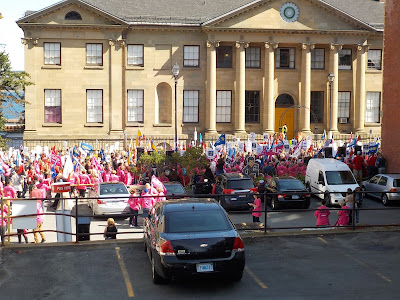 |
| Working with politics |
In the Second Letter of Peter, the inevitable yet delayed “end times” are used to motivate ethics of continuing to live as Jesus taught.
* [3:12] Flames…fire: although this is the only New Testament passage about a final conflagration, the idea was common in apocalyptic and Greco-Roman thought. Hastening: eschatology is here used to motivate ethics (2 Pt 3:11), as elsewhere in the New Testament. Jewish sources and Acts 3:19–20 assume that proper ethical conduct can help bring the promised day of the Lord; cf. 2 Pt 3:9. Some render the phrase, however, “desiring it earnestly.”In the Gospel of Mark, political enemies join forces to attempt to discredit Jesus.
* [12:13–34] In the ensuing conflicts (cf. also Mk 2:1–3:6) Jesus vanquishes his adversaries by his responses to their questions and reduces them to silence (Mk 12:34).The USCCB commentary on Paying Taxes to the Emperor is based on Matthew 22:21 .
* [22:21] Caesar’s: the emperor Tiberius (A.D. 14–37). Repay to Caesar what belongs to Caesar: those who willingly use the coin that is Caesar’s should repay him in kind. The answer avoids taking sides in the question of the lawfulness of the tax. To God what belongs to God: Jesus raises the debate to a new level. Those who have hypocritically asked about tax in respect to its relation to the law of God should be concerned rather with repaying God with the good deeds that are his due; cf. Mt 21:41, 43.Colleen Chiacchere asks us to reflect on ways in which we can be open to opportunities to “grow in grace and in knowledge of our Lord”.
As followers of Christ, we have a duty to participate and live out our faith in all areas of our lives, including and especially in the public sphere. Jesus highlights this duty for us in this interaction. Religion and the public life/common good are not in opposition with each other. Even more so, it is an important part of our duty as Christians to hold each other accountable, to promote social justice and help bring about the Kingdom of God here on earth.The Word Among Us Meditation on Mark 12:13-17 emphasizes the need to be sincere, honest, and open in our relationships.
Don’t make the same mistake! God asks you to be sincere, honest, and open in your relationships—especially with the people you may find difficult. Show them as much charity and respect as you can, but never be fake. If you need to discuss a problem with someone, try your best to do it with humility and love for the person. You’ll find that your efforts will free you to love that person even more—and it will also help him or her to respect you all the more.Friar Jude Winkler identifies the difficulty of the author of 2 Peter, that in 120 AD, Jesus had not yet returned in glory. The people opposed to Jesus attempt to show Him complicit with the occupying power is defeated by their own familiarity with the coins of Caesar. Friar Jude reminds us that our hearts belong to God not an national power.
The account of the work of Saint Boniface by Franciscan Media describes protection given this reformer by the political powers that ultimately failed in his murder.
In order to restore the Germanic Church to its fidelity to Rome and to convert the pagans, Boniface had been guided by two principles. The first was to restore the obedience of the clergy to their bishops in union with the pope of Rome. The second was the establishment of many houses of prayer which took the form of Benedictine monasteries. A great number of Anglo-Saxon monks and nuns followed him to the continent, where he introduced the Benedictine nuns to the active apostolate of education.Cynthia Bourgeault asks us to Imagine how the energies of our planet would shift if we as Christians took seriously our obligation to work with the Law of Three as our fundamental spiritual praxis.
The Paschal Mystery is another example, with affirming as Jesus the human teacher of the path of love; denying as the crucifixion and the forces of hatred driving it; and reconciling as the principle of self-emptying, or kenotic love willingly engaged. The fourth, new arising revealed through this weaving is the Kingdom of Heaven, visibly manifest in the very midst of human cruelty and brokenness.The self-emptying, or kenotic love of Jesus is our desire in the problems and conflicts of living as Christians.
References
(n.d.). 2 Peter, chapter 3 - United States Conference of Catholic Bishops. Retrieved June 5, 2018, from http://www.usccb.org/bible/2peter/3
(n.d.). Mark, chapter 12 - United States Conference of Catholic Bishops. Retrieved June 5, 2018, from http://www.usccb.org/bible/mark/12
(n.d.). Creighton U Daily Reflections .... Retrieved June 5, 2018, from http://onlineministries.creighton.edu/CollaborativeMinistry/daily.html
(n.d.). 9th Week in Ordinary Time - Mass Readings and Catholic Daily .... Retrieved June 5, 2018, from https://wau.org/meditations/
(n.d.). Saint Boniface – Franciscan Media. Retrieved June 5, 2018, from https://www.franciscanmedia.org/saint-boniface/
(n.d.). Daily Meditations Archive - Center for Action and Contemplation. Retrieved June 5, 2018, from https://cac.org/richard-rohr/daily-meditations/daily-meditations-archive/
No comments:
Post a Comment